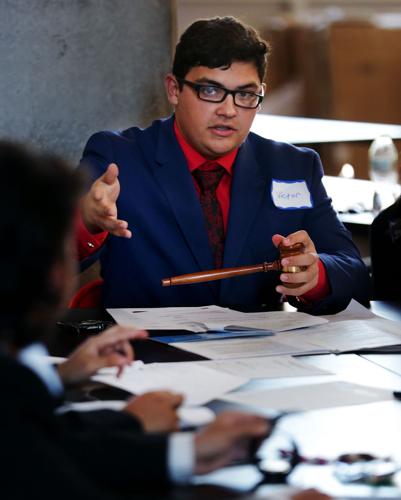How do today’s youths prepare for a workplace where their competition will one day be robots, machines and drones?
It is a question many are grappling with as new technology and automation accelerate the pace by which young people need to be prepared.
But, for what sorts of jobs should they prepare?
“That’s the bigger problem,” said Chuck Zaepfel, southern district director for Junior Achievement of Arizona. “We have students that are trying to figure out their way, but they don’t know what they don’t know.”
A recent survey by Junior Achievement USA showed that 77 percent of parents and teenagers are concerned about having a successful job or career in the future because of the threat of automation.
Entry-level jobs are already disappearing. Some chain restaurants are going to kiosks for ordering, delivery jobs may soon be replaced by drones and store clerks are being replaced by self-checkout stands.
“I’m kind of surprised the concern is so low,” Zaepfel said. “Everyone should be concerned and start preparing for a world that’s going to be different.”
Ali Abdulameer is majoring in business at the University of Arizona with the hope of owning his own business and thinks about someday collaborating with robots.
“Yes, it’s intimidating because machines can do everything faster and better,” the 18-year-old freshman said. “But human employees are still better because they can problem-solve and machines don’t have that critical thinking … yet.”
Abdulameer likes the idea of taxing robots, an idea suggested by Microsoft co-founder Bill Gates.
“That money should go to secondary education to keep us out of those manual jobs that will be taken by robots,” he said. “Taxing those robots would help maintain balance.”
For now, Abdulameer is refining his soft skills learned through his participation in Junior Achievement at Tucson High Magnet School.
Skills such as networking, writing business plans, adding creative skills to technical ones — things that would distinguish him from a machine.
“It doesn’t keep me up at night but it does worry me,” Abdulameer said. “I’m sure there’s a way to grow machines to help do things better with us instead of for us.”
Tucson High senior Victor Moreno spent the summer working for a mortgage company building landing pages and creating targeted Facebook ads.
The 17-year-old plans to attend the UA next year and study electrical engineering and work on developing new apps. He believes higher education is the only way to stay ahead of the machines.
“Automation is a big thing that is going to shrink the job market and make it more competitive,” Moreno said. “In many cases it’s much easier to use a machine than deal with a person.”
He said today’s youths need to unplug more often and learn human social skills that robots don’t have.
“There are certain skills everyone should have, such as communicating clearly, proper dress, good body language, not using slang,” Moreno said. “You can also get involved in extracurricular programs and internships to get a specific edge over the shrinking job market.”
Junior Achievement, for one, is trying to impress upon students the pending reality.
“We teach entrepreneurial thinking, financial literacy, money management,” Zaepfel said. “We teach about their tone, to look someone in the eye when they shake hands. These are irreplaceable skills regardless of what happens in the world.
“Every job will still have some human interface.”
In 20 years, the availability of plumbing, electrical and homebuilding jobs will likely shrink but not disappear entirely.
“There are a lot of blue-collar jobs that we will still need,” Zaepfel said. “Yet, today’s kindergarteners may never need a driver’s license.”
University of Arizona President Robert Robbins is also working to get ahead of the curve, sharing a vision of a highly automated and cross-disciplinary future.
Robbins sees this as an opportunity for the UA to mitigate the negative effects and to react in a productive way.
“I want deans to think holistically” and to create a workforce that can respond to these changes, Robbins said.





